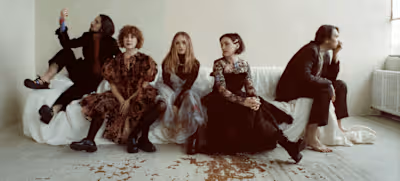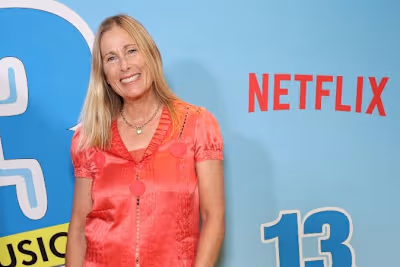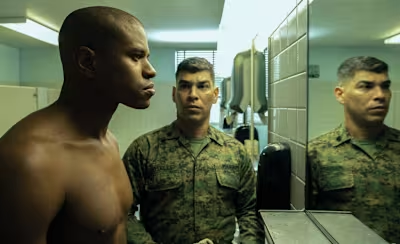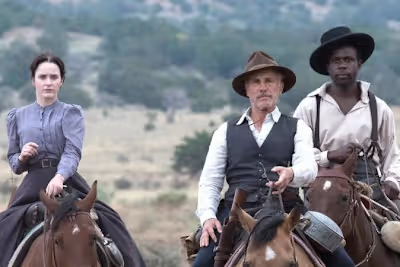Parker Posey talks ‘Party Girl’ and ‘Beau is Afraid’
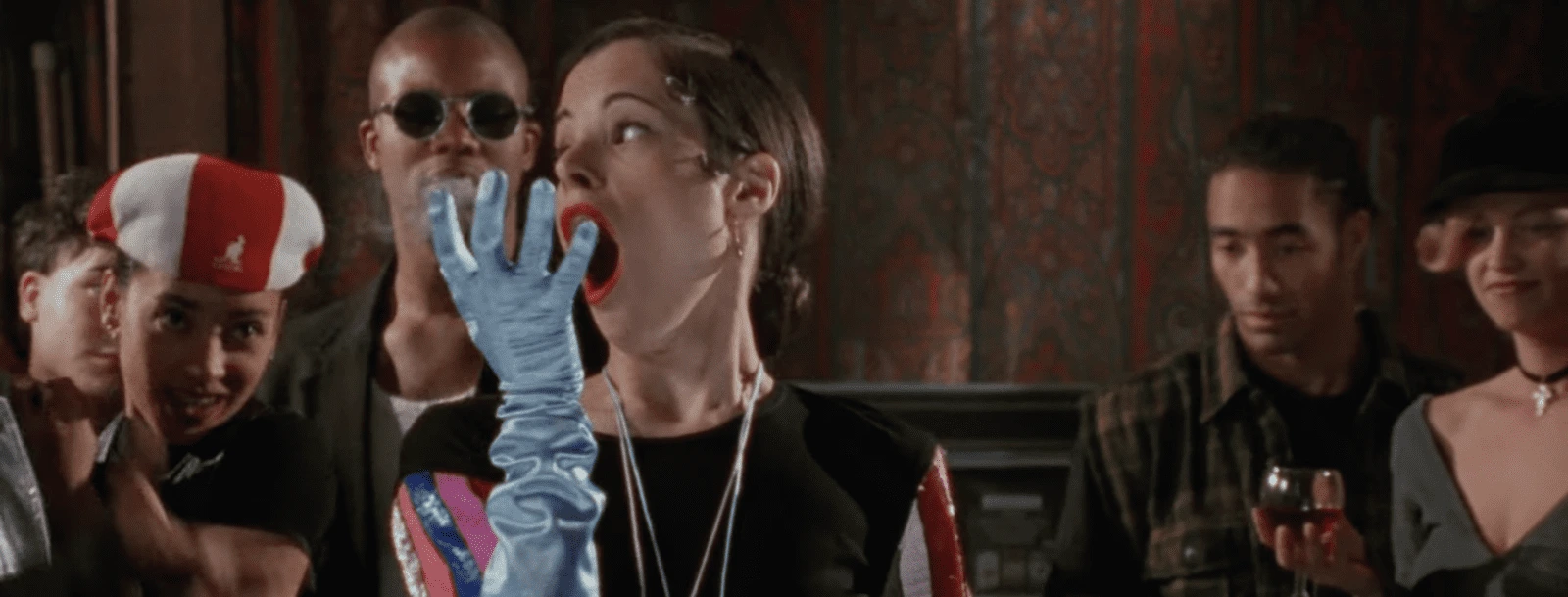
The indie darling opens up about her work past and present: ‘Until our dying day, we will always be struggling or wanting’
“Falafel with hot sauce, a side order of baba ghanoush and a seltzer.” That’s what Mary would order from Mustafa every day to win over the vendor in the ‘90s indie classic “Party Girl.”
“Party Girl” was a hit at Sundance in 1995 and became a cult classic after it flopped in theaters. Mary, played by Parker Posey, lives in a run-down New York apartment that she can’t afford, but somehow her closet is filled with couture. She’s a funny and complex character inspired by the city’s infamous Club Kids — some of whom, like Lady Bunny and the It Twins, make cameos during rave scenes.
To make rent and climb the ladder of the underground club scene, Mary throws an illegal rave in her apartment that lands her in jail. Her godmother Judy (Sasha von Scherler) bails her out, and to return the favor, the party girl has to work with her as a librarian. The job gives Mary a purpose she didn’t find in the club scene. It turns out you can love both Christian Dior and the Dewey Decimal System.
Parker Posey built her career playing characters like Mary in indies, including movies by Wes Craven, Christopher Guest, and now Ari Aster’s new movie starring Joaquin Phoenix, ”Beau is Afraid.” Posey plays Elaine Bray, Phoenix’s childhood lost love in a twisted comedy about a mother’s sick love (or hatred) for her son.
“Beau” is in theaters across the city, and on Saturday, May 6, “Party Girl” returns to Brooklyn at Nitehawk Williamsburg. The movie is being re-released by Fun City Editions, which is making a restored version available on DVD.
Parker Posey spoke with Brooklyn Magazine about the success of “Beau is Afraid” and what it means for the kind of movies she loves. Posey also talks about how New York keeps “Party Girl” alive.
I saw “Beau is Afraid” last night.
Are you afraid?
I was afraid during the scenes on Skid Row.
It’s like a dream, right? It’s like a nightmare. How did Ari Aster do it? I read the script and then to see it done with such great direction and a real world for these characters to exist in is so special and unique. He’s the real deal. I was so excited to be a part of it but I wanna hear what you thought.
I thought it was hilarious. In one of the early scenes, a reporter describes a naked stabber on Skid Row as uncircumcised. Nonchalant details like that made me laugh.
[Laughs.] Kudos to A24. I don’t know how old you are, but I’ve been hanging out with some 30-year olds while I’m doing press. They seem to think film’s coming back and that people are starting to have conversations about the culture in relation to the movies that are being made. I’m excited about that because I love that kind of filmmaking.
Anyway, “Party Girl,” ask away.
When I saw Lady Bunny in the opening party scene I knew ‘Party Girl’ was for me. The movie didn’t have a huge budget, but the downtown scene of the ‘90s was so creative and interesting that all you had to do was include people from the scene to make “Party Girl” authentic.
New York has a performative aspect to it, but imagine when it was performative when there were no cameras around. Then you get more theater, more expression and people in the moment performing. When you would go out it wasn’t about how you look, but your story and your ability to dance or strike up a conversation about your hair, make-up or outfit, but the conversations would go to more interesting places. I wasn’t a Club Kid, but I think my character Mary is a good representation of it.
Why weren’t you a Club Kid?
I couldn’t afford those clothes and live that life. But if I could, Mary is how I would have looked. There were a lot of people stylistically and collaboratively involved in creating Mary’s look in the movie. There was just a spirit back then and I’m excited to see that it could be coming back in whatever way. When I meet young people, I do see a ’90s resurgence of “yeah we see mainstream culture but we’re different” and that New York could be the place to foster that kind of authenticity.
“Party Girl” was always an underground hit.
I think it was one of those movies that got people to move to New York. It was always the goal to have that kind of energy. I don’t really look back a lot so I’ve waited for “Party Girl” to be re-released to think about it, and wow, I’m glad this is back in style because everything old is new again. I’m glad it’s having a moment.
“Party Girl” was the first movie to debut online in 1995 and now everyone streams movies. Does it feel like the movie has come full circle?
That is something I had forgotten, but I remember it happened in the age of Kim’s Video and Rocket Video, so it was really innovative and cool, especially since music has a big role to play in the movie. You have DJs today sampling songs from “Party Girl” and I have the original cassette somewhere upstate. The essence of the movie is being kept alive in this vibrancy of New York where it’s becoming new and fresh. I’m really moved by it actually.
The characters in “Party Girl” are interesting and eccentric, but you can also laugh at them, and it feels okay to do it. Something feels off balance in movies right now. If there’s a privileged character on screen we’re supposed to really despise them. When will be allowed to laugh at people and connect with their humanity again?
Honey, I thought this movie was gonna be the beginning of what was known in the ‘40s as screwball comedy. Where you had Cary Grant and Carole Lombard as rich, wealthy, gilded people who had these ridiculous problems, and who got upset and who yelled at each other and fought and were funny and like screaming over things and running around like fools. Movies like “His Girl Friday.”
It’s wit that you’re talking about, and, God, humor has changed so much. So many stories are still through the male gaze. Back then when they made movies, I think the relationship between men and women just had a lot more grace to it. The movie stars held a different certain persona that was more popular than it is now.
It’s like audiences cares more about a character they’re familiar with than enjoy watching an actor create a character.
A lot of characters are more like a cartoon now with a different kind of dialogue. I’m not saying that I wouldn’t want to act in a Marvel movie, you know, I played Dr. Smith in “Lost in Space.” I love acting in genre movies, it’s just the superhero genre is all about power.
What do you mean?
It’s who’s going to win and who’s going to lose. It’s the binary of “this or that” and it’s really indicative of the culture that we’re in. Are you making money or are you not? Do you have power or do you not? Are you a victim or not? What I love about “Beau is Afraid” and “Party Girl” is they bring characters to the movies that have a certain gravitas.
Since Covid, younger audiences are really interested in having dialogues about film because, hey, if you’re not having the dialogue about it, then it’s not going to exist. People going into a theater and coming out kind of changed — and feeling feelings that they haven’t felt before — is something we need. There’s a place for that. There’s a place for not knowing what to expect, and that’s a really, really special place.
Have you thought of writing or directing your own movies? I feel like you could create a platform for interesting stories and characters that you’re known for.
I have a lot of ideas and I’ve tried pitching them over the last 10 years. I think they were ahead of their time, but I think after Covid they may be more on point and of this time. I got burned in a real estate debacle that I can’t talk about, but New York can really get you down.
I was brought back by a play I was in the last four months, “The Seagull/Woodstock, NY” at the Pershing Square Signature Center, and my takeaway was I want to direct. I love to direct theater and find the new forms. That’s why I love Chekhov so much: he was pining away about new forms and new ideas. Until our dying day, we will always be struggling or wanting. I will always be having that. So, I mean, we’ll see if I fit in. It’s not really up to me. It’s like Vegas, it’s like leaving it up to the gods and just being at the right place in the right time and doing self-care and keeping your light lit. That’s the work, right?
Like this project
Posted Sep 22, 2023
The indie darling opens up about her work past and present: ‘Until our dying day, we will always be struggling or wanting.’
Likes
0
Views
13


